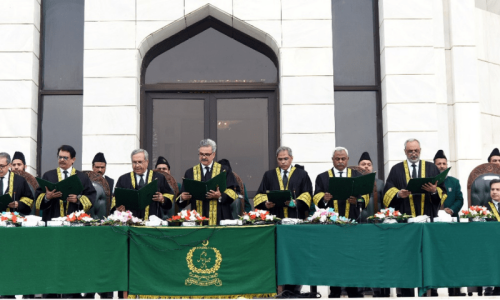• Proposes 14pc interest rate on bill instalments, premium on priority connections
• Set to be discussed at Dec 19 public hearing, new regulations come despite surplus capacity, declining consumption
ISLAMABAD: The revised consumer service manual unveiled by the power regulator Nepra introduces additional charges and stringent measures for electricity consumers, including a 14 per cent interest rate on bill instalments and an ‘urgent fee’ for priority connections.
The proposed regulations — set to be discussed at a public hearing on Dec 19 before implementation — have been announced despite a surplus in capacity and declining consumption.
The new consumer manual also seeks restrictions and penalties on multiple connections at one premises and higher penalties on detection bills that are issued by power distribution companies (Discos) for suspicious consumption like a slow meter, a defective meter, theft, etc.
Under the proposed amendments, consumers seeking priority connections will now face an ‘urgent fee’ of Rs15,000 for single-phase and Rs30,000 for three-phase meters.
This fee is in addition to the regular charges for new connections for domestic and commercial users (up to 15 kilowatts) and industrial and agricultural users (up to 8 kW), where only energy meters and cable are involved but no distribution transformer.
Interestingly, in a recent public hearing, the power companies reported that against 5pc growth forecast for electricity demand for the current fiscal year, the consumption was actually down 13pc, mainly because of higher tariffs.
Nepra members expressed concern that more than 350,000 applications for new connections were pending with Discos by the end of July 2023, while the demand was going down, leading to a higher impact of capacity charges.
At present, new connections should be provided to these categories within 30 days against payment of Rs8,500 to Rs11,500 for a single-phase meter involving 20- to 40-meter cable and from Rs36,500 to Rs50,000 for a three-phase meter.
With the proposed urgent fee, Discos would be required to issue a demand notice the next day and ensure a power connection within two working days after the payment. The failure to install a new connection would require the power distribution company to refund the urgent fee and initiate an unspecified disciplinary action against the official responsible.
Markup on instalments
In another major change, the proposed consumer service manual also seeks a 14pc interest rate on instalments of bills for any reason, though they are mostly sought because of financial constraints.
In case a consumer seeks instalments for the current bill, there would be no late payment surcharge (LPS) or markup on the first instalment if paid within the due date, but the remaining instalments would attract a 14pc markup per year on a pro rata basis.
In case of arrears or unpaid detection bills, the applicable LPS along with a 14pc markup would be charged on all instalments on a pro rata basis. If an extension in due date is requested before the deadline, there will be no LPS, but a 14pc markup will be applied.
The Discos would have the discretion to decide the number and duration of extensions, depending on their business requirements, and generate computerised bills for instalments.
The proposed amendments also envisage permission for the Discos to confiscate electric appliances and equipment besides imposing heavy penalties like “detection bills” equivalent to five years of power consumption against consumers and premises found in electricity theft to make up for the energy losses.
The new manual also proposes the removal of multiple connections and separate electricity meters on residential premises that do not have direct and separate entrances from the main roads.
Officials at Discos would review these cases by visiting all premises above 10 marlas or equivalent where more than one connection already exists and serve a 15-day notice to the consumers having more than one non-TOU meter to apply for the consolidation of connections to convert all meters into ToU meters.
In case of separate meters are needed, consumers would be required to produce authentic documents regarding bifurcation or sub-division of house/premises.
Direct supply from a distribution line or supply without a meter or a meter that is tampered or its record is not found with Disco or there is the presence of a current reversing transformer, jumper, or shorting wire or loop connection or other similar device in any part of the building or its premises would be considered theft.
In such cases, the Disco will process the case as theft of electricity and register the case with police under relevant provisions.
Published in Dawn, December 11th, 2023














































